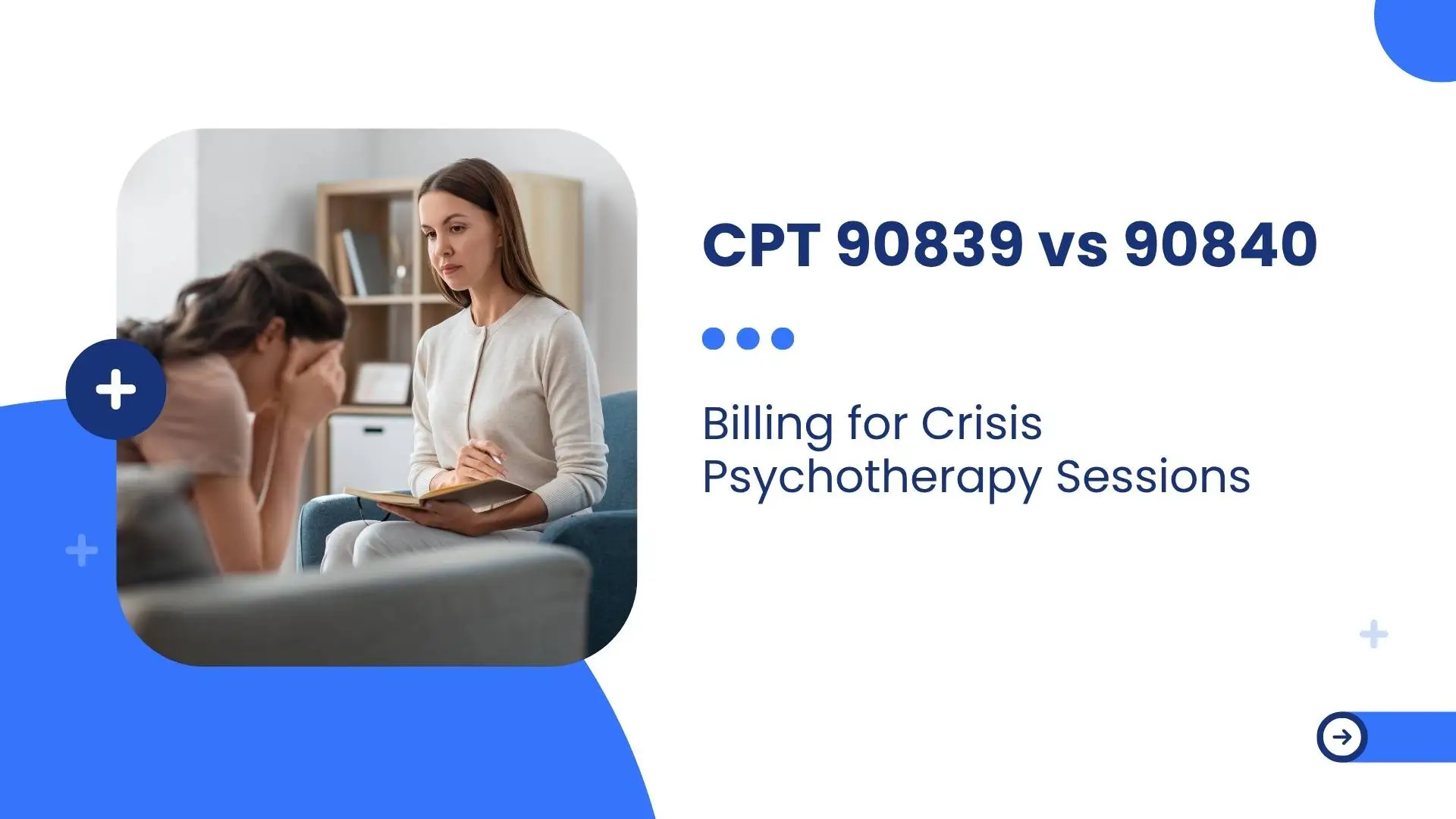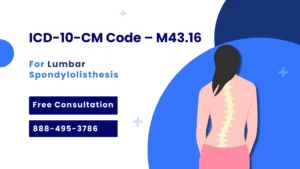Crisis psychotherapy attends to patients who need mental health care. Quick involvement for managing (Quick therapy) is required when a patient suffers a sudden psychological crisis. This Crisis psychotherapy requires more attention and long sessions to control the emotions of the patient.
Specific mental health CPT codes are available to bill these long sessions to ensure that the provider gets proper reimbursement for their work. CPT 90839 and CPT 90840 are two main codes for these therapies. Both codes are intended for urgent, in-person treatment, specifically designed for crisis stabilization.
Therapists can utilize these codes without fear of financial loss, receiving adequate compensation for mental health services rendered while care is streamlined. In this article, we’ll delve into the differences pertaining to CPT 90839 vs. CPT 90840, when to apply them, and the role these codes play in reimbursement.
What is CPT 90839?
The 90839 code applies to the initial 60 minutes allotted for emergency therapy sessions. It also includes the time spent on stabilizing the patient, evaluating safety, and addressing mental health care emergencies as a priority.
Who can I bill it
· Qualified mental health providers
· Psychiatrists
· Psychologists
· licensed clinical social workers
· licensed professional counselors
Cases when to use 90839
· Suicidal thoughts or threats
· Panic attacks of extreme intensity
· Abrupt reactions to trauma
· A sudden sorrow or loss that disturbs mental health
Documenting the session time, initial status of the patient’s mental health, and management techniques used to provide sudden relief to the patient from his problem.
What is the 90840 CPT code?
The 90840 is an add-on code that is used with CPT 90839. It is used to mention every half an hour of additional crisis psychotherapy that exceeds the one-hour boundary.
As a supplementary code of 90839, it cannot be billed without it. For a session that lasts for 90 minutes, for the first 60 minutes the provider will use the primary code 90839, and the add-on code 90840 will be added for the next 30 minutes.
This code is mainly used in cases such as long-lasting crises, where one hour of therapy is not enough for the patient. For example, Prolonged suicide risk assessment, managing acute psychotic breaks, or care coordination with emergency responders.
However, it should not be used:
· As a primary code
· When the time does not exceed the 60-minute mark
· For average therapy sessions
CPT 90839 vs CPT 90840: Key Differences
Both crisis codes are essential in crisis therapy sessions, but each has its specific use. Here is a simple comparison of the two codes to explain their use cases.
| Feature | CPT 90839 | CPT 90840 |
| Use Type | Primary crisis code | Add-on code for extra time |
| Time Covered | First 60 minutes | Each additional 30 minutes |
| Can Be Billed Alone? | Yes | No (must follow 90839) |
| Common Session Lengths | 30–60 minutes | More than 60 minutes |
| Patient Need | Initial emergency intervention | Extended crisis intervention |
Pairing with other related codes
A critical concern that providers often pose is, for reimbursement, which pays more, 90837 or 90839? While CPT code 90837 covers a full 60-minute session of therapy, in most cases, 90839 pays more due to the session being of a more acute nature. Clear documentation, however, is required to prove that the session met crisis criteria.
Another common question is, can you use CPT Code 90839 with 90837? The answer is no. Both codes cannot be claimed together on the same day since both are for a complete 60-minute session.
How They Fit into Crisis Therapy Services Billing
A structure must be followed when billing for these crisis services:
· Initiate billing with 90839 if the session falls in crisis criteria and is over 30 minutes.
· If the session takes the time more than one hour, then bill 90840 for each additional 30 minutes.
Documentation requirements
· Time spent with the patient
· Summary of the crisis
· Management techniques used
· Response from the patient on the intervention used to control the emergency
Most importantly, providers need to remember the rules provided by the payer. Some payers require prior authorization or have restricted the number of crisis sessions that can be billed in a given timeframe.
Also note if an interactive complexity code was required due to language barriers or the inclusion of third parties, such as law enforcement or family members.
Reimbursement Remarks
Reimbursement for CPT 90839 vs CPT 90840 depends on the individual insurer, duration of the session, and the documentation provided. In most cases:
· CPT 90839 will reimburse higher than other therapy codes and 90837 due to the urgency of services.
· CPT 90840 will add value when sessions extend beyond an hour.
Failure to meet requirements will lead to denial. Lack of proper, detailed documentation of the crisis will lead to unclear documentation, resulting in the refusal of provided services. Ensure precise timestamps are included, with the reason for the crisis.
Tips for faster reimbursement
· Submit clear notes with clearly mentioned therapy session time and summary of the session
· Don’t pair 90839 with any unrelated code of E/M for the same day visit
· Only hand over this coding to Trained staff who know how to use these codes correctly
Optimal Approaches for Mental Health Providers
Correct application of crisis codes boosts care and practice revenue. Observe these guidelines:
· Apply 90839 only when there is an urgent mental health intervention during the session
· Add 90840 if the session exceeds the 60-minute mark
· Do not apply these codes for routine therapy or check-in sessions
· Follow payer-specific billing policies
· Collaborate with the billing departments to minimize coding mistakes
Real-life use refers to hospital-based care, managed private practice patient care in response to urgent client needs, or school counselor-managed student crises.
In addition to crisis therapy codes like 90839 and 90840, mental health providers also frequently use CPT 90838 when psychotherapy is delivered alongside an evaluation and management (E/M) service. This 60-minute code is essential in differentiating standard long sessions from those requiring urgent care.
For a detailed breakdown of CPT 90838, when to use it, and other related codes for psychotherapy billing, check out our article: CPT 90838: Psychotherapy, 60 Min with E/M Service & Related Codes
Final Remarks
CPT 90839, in contrast to CPT 90840, serves a specific purpose regarding the billing of mental health services provided during urgent care situations. These codes are not intended for routine therapy sessions; instead, they are meant for acute psychological medical interventions that require immediate and extended attention.
Understanding the distinction aids providers in receiving accurate reimbursement while patients are ensured access to the required support without unnecessary delays.
If in doubt, consulting a billing expert minimizes claim denials and enhances approval rates.
When supported by concise guidelines, maintaining accurate billing practices benefits the delivery of care and optimizes operations within your practice.





